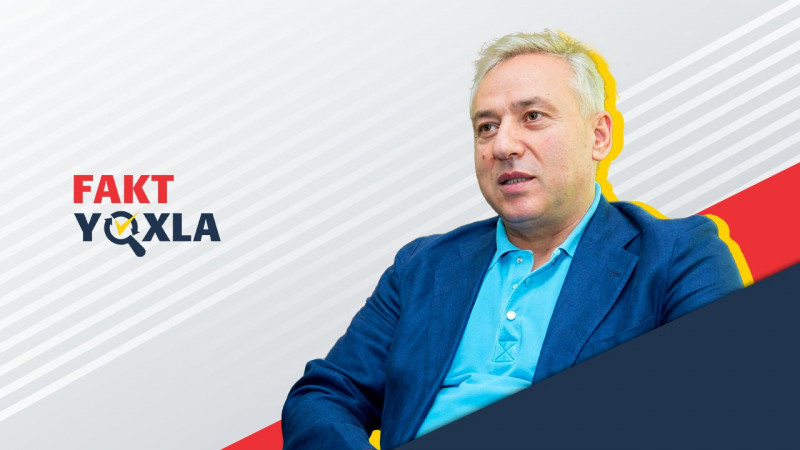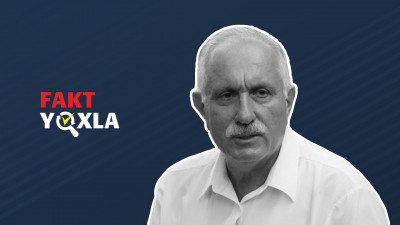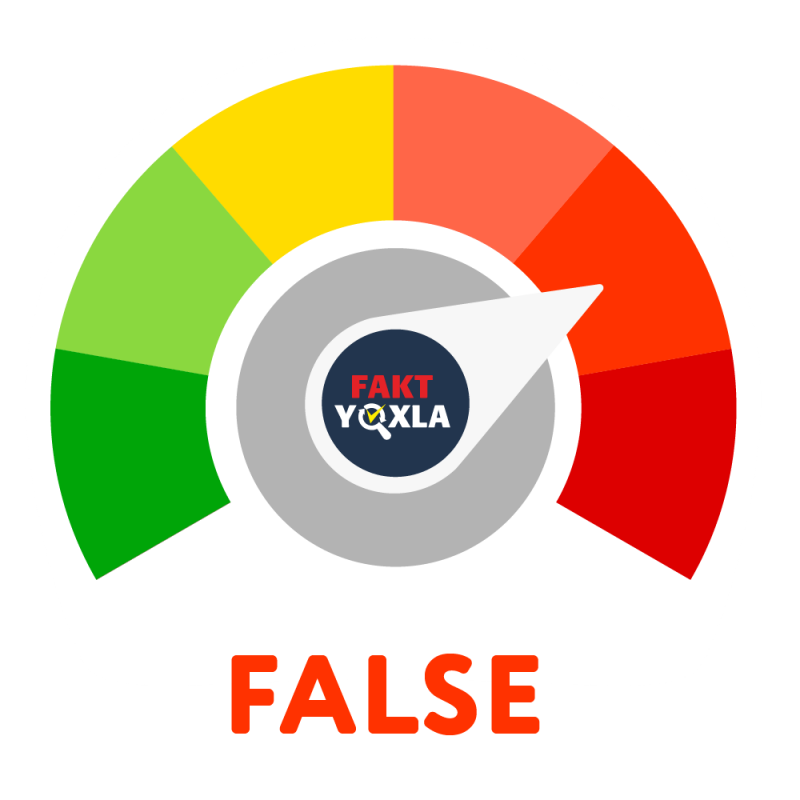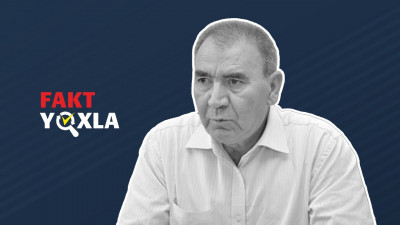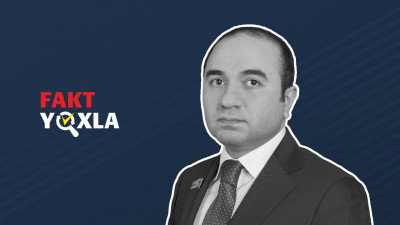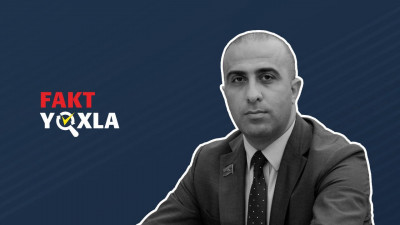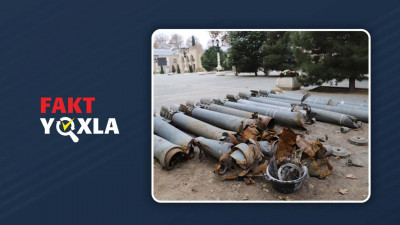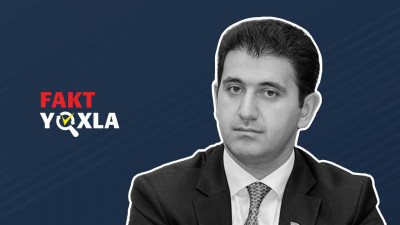"In the last 30 years, we live in a country where 1 out of every 8 people is a refugee or internally displaced person. During this period, there was no international support."
Nasib Mahamaliyev, a deputy of the Milli Majlis, said this in an interview with Pravda.az.
Fakt Yoxla examined whether this claim was true.
United Nations High Commissioner for Refugees
The United Nations High Commissioner for Refugees is one of the first international organizations that brought management experience and necessary assistance to Azerbaijan in solving the refugee problem. Starting from December 1992, projects worth 112 million US dollars have been implemented in Azerbaijan through this institution.
For example, in 2018, the project “Protection of IDPs and assistance to them in Azerbaijan”, from which a total of 7,844 IDPs benefited, was implemented in Baku, Absheron, Sumgayit, Fuzuli, Aghdam, Goranboy, and Jabrayil with a total budget of 311,612 USD.
Since 2005, the Japanese company Fuji Optical Co. Ltd has carried out an eye examination and glasses distribution campaign in Azerbaijan through the UN Refugee Agency. In 2021-2022, the company sent 3,500 high-quality optical glasses to Azerbaijan.
More than 65,000 high-quality glasses have been donated to Azerbaijan by the mentioned company, and eye examinations have been conducted for more than 33,000 internally displaced persons, refugees, asylum seekers, and vulnerable people. During the past period, the company spent more than 3 million US dollars for the implementation of its humanitarian missions in Azerbaijan.
World Bank (WB)
101 community micro-projects have been implemented in 25 new settlements built for IDPs within the framework of the project signed between the World Bank and the Government of Azerbaijan with a grant of 2 million US dollars allocated by the Japan Social Development Fund. 242 young IDPs completed various vocational training. 14 sports complexes, 22 computer centers, 16 youth-entertainment and 13 household-educational institutions, and 1 electronic library were created.
In 2019, as a result of the joint cooperation between the Government of Azerbaijan and the World Bank, 2,500 internally displaced youth were involved in vocational training and provided with the necessary equipment.
Since 2022, the World Bank has been conducting a grant project "Research, Analysis, and Capacity Building for Reconstruction and Peacebuilding in Azerbaijan". Within the framework of the project, the experts of the Sigma SG company collect and analyze information about the demographic, social, and economic situation of IDPs in 22 cities and districts, as well as the opportunities and abilities to earn income through employment and self-employment.
International Committee of the Red Cross
The International Committee of the Red Cross (ICRC) has implemented psycho-social support projects for the families of missing persons related to the Nagorno-Karabakh conflict, as well as social, economic security, and health care programs in a number of cities and districts of Azerbaijan.
In 2018, a psycho-social support project was organized for the families of missing persons in Ganja, Shaki, Shirvan, Sabirabad, Hajigabul, Aghsu, Kurdamir, Shamakhi, Gobustan, Goygol, Dashkasan, Gabala, Zagatala, Goychay, and Ujar. In the same year, a health care program project took place in Baku, Tartar, Aghdam, Goranboy, Fuzuli, Aghstafa, Tovuz, Aghjabadi, Gadabay, Gazakh, and Barda.
Kızılay (Turkish Red Crescent)
The measures implemented by this international humanitarian organization include:
- In 1993, Turkish Red Crescent tent camps were established for IDPs in Barda and Aghjabadi districts. The needs of 13,000-15,000 internally displaced persons temporarily settled in those camps for food, non-food, and medical assistance were met by the Turkish Red Crescent organization;
- Although it stopped working in 1996-1998, it started working again in the second half of 1998. 1,401 families (5,800 people) in the tent camp in Barda district and 780 families (2,990 people) in the tent camp in Aghjabadi district (a total of 2,181 families for 8,790 people) were provided with monthly food assistance;
- During 1993-2015, the amount of aid provided amounted to 18 million 226 thousand US dollars.
Japan
Japan is one of the countries that provide the most assistance to refugees and IDPs in Azerbaijan. Japan provided the following assistance to Azerbaijan:
- Blankets and tents worth 1 million US dollars through UNHCR in 1993;
- In 1996, within the framework of the UN World Food Program, food products worth 1 million US dollars;
- Within the framework of the UN World Food Program, food worth 300,000 US dollars in 1998, and 900,000 US dollars in 2000;
- 2 Fuzuli schools in Beylagan, 1 Lachin school in Barda, and 1 school in Aghdam were built for IDPs through Relief International, the humanitarian organization of the United States, with funds in the amount of 40,000 US dollars allocated in 2001.
- In 2002, a water purification plant worth 81,000 US dollars was installed in the Galagayin tent camp in Sabirabad district.
United States of America
The activities of the United States Agency for International Development (USAID), which began to operate in Azerbaijan in 1992, were focused on humanitarian aid projects, especially assistance to refugees and internally displaced persons, until 1998.
The main activity of USAID, which is funded by the US government, in Azerbaijan is limited to humanitarian aid according to the 907th amendment to the Freedom Support Act. Those programs focus on community development, health, economic opportunities and support services, including training and business management advice for vulnerable groups. Other programs have focused on US-funded health clinics serving people in need and the distribution of humanitarian packages, including medicine, medical equipment, shelter items, food, and clothing. USAID also provided food assistance to refugees and other vulnerable groups through World Food Program assistance.
South Korea
The cooperation of the Korea International Cooperation Agency ("KOICA") with Azerbaijan started in 1994. The history of the KOICA program began in 1994 when the organization provided assistance to Azerbaijan in the amount of 50,000 US dollars due to an urgent situation. From 1996 to 2005, KOICA organized training programs worth 300,000 US dollars for 65 people.
With the financial support of KOICA, the International Organization for Migration (IOM) has implemented the project "Integrated rural development in internally displaced communities in Azerbaijan with the reconstruction of the underground water-supply system". As a result of this project, more than 8,000 families have been provided with sustainable water through the restoration of 40 canals, which are a traditional and sustainable water supply system.
On April 27, 2020, in order to reduce the negative socio-economic impact of the spread of the COVID-19 virus among IDPs and to ensure that they are supplied with hygienic and medical supplies and daily necessities, a memorandum was signed between the Azerbaijan Representative of KOICA and the State Committee for Affairs of Refugees and Internally Displaced Persons. According to the memorandum, with the financial support of KOICA, 300 parcels containing various food and medical products were distributed to families from vulnerable groups, including some internally displaced persons, settled in Baku.
Germany
On the order of the German Federal Ministry for Economic Cooperation and Development, the German Agency for International Cooperation (GIZ) has started the implementation of the project "Economic Participation of IDPs and Low-Income Populations in the South Caucasus" with a budget of 6 million euros from 2018 in order to support the participation of IDPs in the economic sphere in Georgia and Azerbaijan.
Switzerland
Swiss Agency for Development and Cooperation:
- In 2005, in order to provide legal and medical assistance to refugees in Azerbaijan, it implemented a project called the "Refugee Assistance Program" with a budget of 1 million 250 thousand US dollars;
- In 2004-2006, the project "Repatriation of Internally Displaced Persons" with a budget of 849,000 US dollars was implemented. As a result, 283 individual houses were restored in Fuzuli district. The implementing partner of the project was the Norwegian Representative Office of the international humanitarian organization Norwegian Refugee Council in Azerbaijan;
- For the purpose of construction of private houses for 132 families of displaced persons in the Sahil settlement of Garadagh district under the project "Repatriation of Internally Displaced Persons" implemented by the Norwegian Refugee Council, 77 thousand US dollars were allocated by this organization, and 104 thousand US dollars were allocated by the Government of Azerbaijan as a project share.
Furthermore, in 2007-2012, the project "Increasing opportunities for rural development and food supply for IDPs settled in the newly built settlements of Aghdam district" was implemented by the UN Food and Agriculture Organization (FAO), financed by the Swiss government. The budget of the project was 2 million 470 thousand US dollars. The project covered 3,200 families or 13,500 people.
Islamic Republic of Iran
The Representation of the Red Crescent Society of the Islamic Republic of Iran in Azerbaijan has been implementing various humanitarian projects in Azerbaijan since 1993:
- In 1993, 7 tent camps for IDPs were built in Bilasuvar, Saatli, and Sabirabad districts, 8,684 tents were installed; as a result, 46,471 IDPs were temporarily settled;
- In August 2001, humanitarian aid consisting of 100 tents, 1,000 blankets, 10 tons of rice, 10 tons of beans, 10 tons of sugar, 5 tons of oil, and 20,000 pieces of soap was brought and distributed to IDPs temporarily settled in Sabirabad district;
- Since 2004, the clinic organized in Baku provides free medical services to refugees, internally displaced persons, and low-income population (about 12-13 thousand people a year). Approximately 5 million US dollars were spent on medical services provided by this clinic to refugees, internally displaced persons, and the low-income population (in 2004-2016).
Italy
In 1997, the Italian company ENI allocated 2 million 200 thousand US dollars to the United Nations High Commissioner for Refugees to finance the project "Displaced Persons and IDPs in Azerbaijan". This donation is the largest donation received by UNHCR from the private sector around the world, as well as the largest private sector assistance for IDPs in the Republic of Azerbaijan.
In November 1999, a tripartite agreement was signed between the Government of Azerbaijan, the Italian company ENI, and the United Nations High Commissioner for Refugees. The commissariat took responsibility for the implementation of this project based on the methods of the implementation plan agreed upon with the other two partners. As a result, UNHCR, together with the State Committee for Refugees and IDPs, built new residential settlements consisting of 253 sawn stone houses in Khanlar district and 124 houses in Beylagan district for IDPs for 18 months to meet the most urgent needs of disadvantaged communities. Schools, hospitals, community centers, and sanitation stations have been built in each settlement to meet the daily needs of the community. This project, in accordance with the implementation of the State Program on Resolving the Problems of Refugees and Internally Displaced Persons, was compiled on the basis of similar projects implemented by UNHCR in many parts of the country since 1995 (2,500 houses were built in different districts, 2,000 houses were repaired in Fuzuli, Tartar, and Aghdam districts). At the same time, a settlement of 145 houses was built by the Norwegian Refugee Council in the Harami plain of Fuzuli district at the expense of UNHCR's own funds. Moreover, about 216 thousand US dollars were spent to solve the drinking water problem of the population in the area of winter deposits of Lachin.
Great Britain
The Representation of Great Britain’s organization "World in Need" in Azerbaijan has allocated more than 150 thousand US dollars for the projects implemented in the country.
More than 530,000 US dollars were spent on the projects implemented by the Central Asia Research and Development (CARD) representative office in Azerbaijan.
"Direct Help to Children" organization operated in 1994-2000. Funded by ECO, UNHCR, and its head office, it provided food aid to mostly children from internally displaced and low-income families, and implemented projects such as school renovation, health education, agriculture, English language, computer courses, etc. About 9 million US dollars were spent on the projects.
Great Britain's international humanitarian organization "Unified Aid for Azerbaijan" (UAFA) provided a number of construction and repair works, as well as food and non-food aid to internally displaced persons. Currently, the organization focuses on projects related to children's health and education. About 1 million 400 thousand US dollars were spent on the projects implemented by the UAFA representative office in Azerbaijan.
Turkey
The Youth Aid Fund established by the citizens of Turkey and Azerbaijan implemented the following measures:
- Since 1996, sacrificial meat is distributed to the families of internally displaced persons, low-income population, and families of martyrs living in Baku city and other districts every year on the eve of the Eid al-Adha;
- The amount of aid was 6 million 487 thousand US dollars.
Thus, a number of international organizations and countries have supported refugees and internally displaced persons in Azerbaijan.
Fakt Yoxla concludes that the claim of the deputy is False



